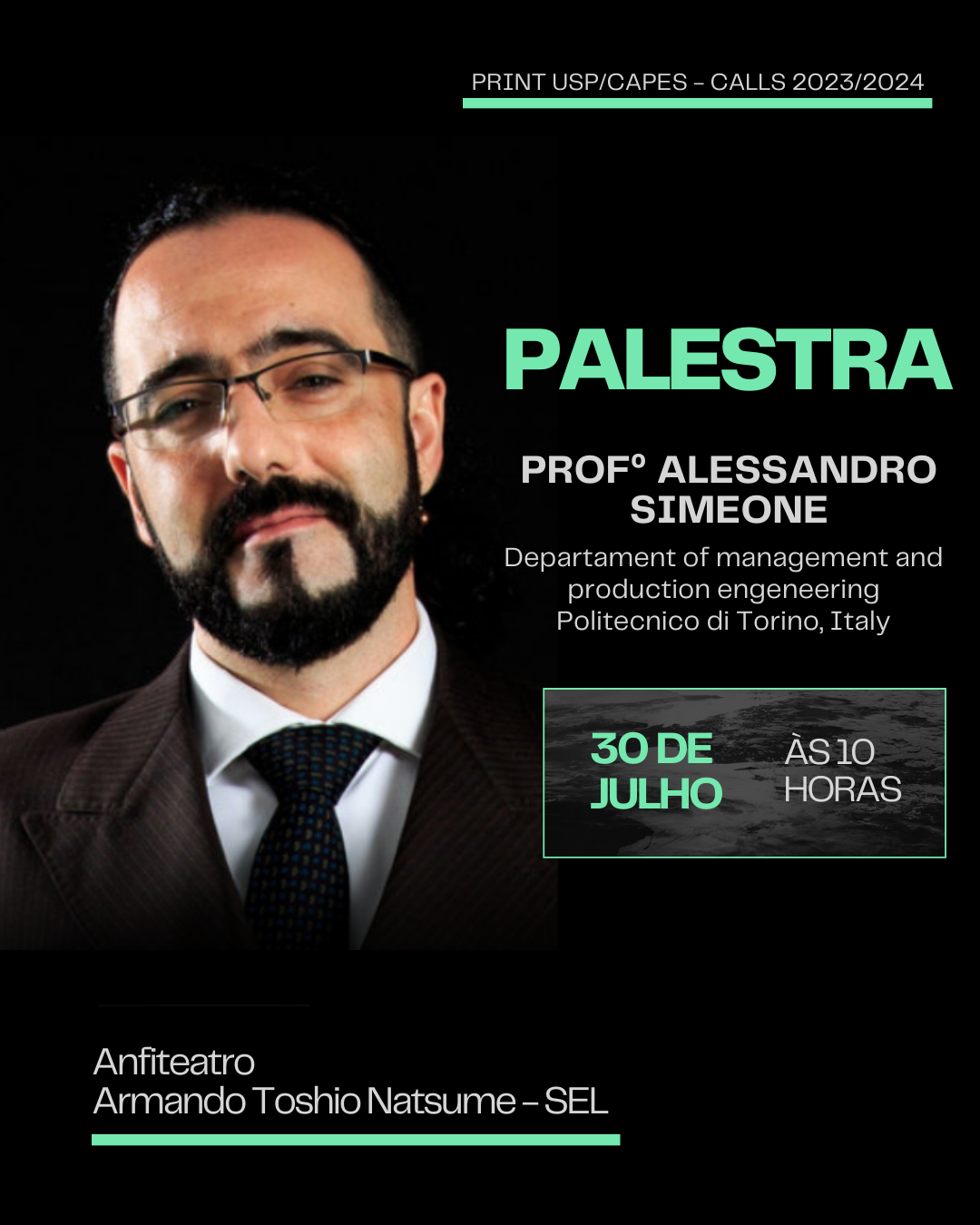Visita e palestra do Prof. Alessandro Simeone da Politecnico di Torino - PoliTO (Italia)
A Escola de Engenharia de São Carlos (EESC) da USP receberá a visita do Prof. Alessandro Simeone, do Politecnico di Torino (PoliTO), Itália, entre os dias 29 de julho e 2 de agosto de 2024.
Confira a programação:
Dia 29
Visita às Áreas 1 e 2 do Campus e Laboratórios do SEL
Dia 30
10h - Anfiteatro Armando Toshio Natsume (SEL
Palestra para a comunidade da EESC “Challenges and Perspectives of human cyber-physical systems for a sustainable and inclusive manufacturing”
Abstract
The rise of Industry 5.0 highlights the synergy between human expertise and intelligent systems, with the goal of improving sustainability and inclusivity in manufacturing. HCPS provides a robust framework for addressing the diverse challenges of modern manufacturing processes, particularly in integrating neurodiverse individuals into the workforce. HCPS dynamically assesses and manages cognitive load (CL) through fuzzy logic inference, integrating real-time data on operator behavior, physiology, workplace settings, and process characteristics to ensure a safe and productive work environment. This multi-layered HCPS framework mitigates operator risk by assessing CL across multiple cognitive dimensions, facilitating personalized support strategies, and optimizing workplace design and digital enhancements.
An essential feature of HCPS is the integration of environmental monitoring systems (EMS) that enable real-time tracking of environmental conditions that affect both manufacturing process efficiency and operator well-being. HCPS ensures that factors such as air quality, temperature, and noise levels are continuously monitored and adjusted to maintain optimal working conditions, improving sustainability and operator performance. Research demonstrates the effectiveness of intelligent robotic assistants in integrating neurodiverse operators into the manufacturing industry. Utilizing collaborative robots (Cobots) and machine learning (ML), a reciprocal learning (RL) framework assists operators in assembly tasks through image acquisition, ML-based classification of workpieces, and Cobot operational tasks. Experimental results show that HRC systems significantly assist neurodiverse operators, reduce errors, and increase productivity by providing continuous guidance and support. Further research in collaborative robotics highlights the potential of HCPS to create inclusive manufacturing environments. Using human-machine collaboration and reciprocal learning, a fuzzy logic cognitive load assessment procedure was developed across multiple cognitive dimensions.
The results indicate that reciprocal learning can effectively reduce cognitive load while improving task efficiency, highlighting the transformative role of intelligent systems in inclusive manufacturing. In addition, HCPS can be augmented with digital instructions that provide real-time, context-specific guidance to operators. This approach significantly improves the accuracy and efficiency of task execution. Various case studies with different scenarios are reported to illustrate the applicability of the different HCPS features, demonstrating significant improvements in accuracy, efficiency, and support for diverse operator needs. The integration of HCPS in manufacturing aligns with the goals of Industry 5.0 and promotes a resilient, adaptive, and inclusive industrial ecosystem.
Dia 31
Reuniões internas com grupo de professores, sobre parcerias para pesquisa.
Dia 1º
14h - Roda de conversa com alunos, apresentando um pouco sobre a instituição Polito, internacionalização, carreira científica e temas de pesquisa.
Dia 2
10h - Anfiteatro Armando Toshio Natsume (SEL)
Seminário de pós-graduação com a apresentação do trabalho de pesquisa: “Connecting Sustainability and Energy Efficiency in IoT-Intensive Manufacturing Systems”

Bio
Alessandro Simeone received his MSc Degree in Management Engineering from the University of Naples Federico II in 2008, with a thesis on the optimization of machining operations on low-machinability alloys, specifically Inconel 718. He earned his Ph.D. in Technologies and Production Systems from the same university in 2013, focusing on multi-sensor process monitoring in the turning of nickel superalloys.
Dr. Simeone began his postdoctoral research at Loughborough University (UK) in 2013, working on the sustainability of industrial processes under the "Eco-Intelligent Manufacturing" project. His research involved developing decision support systems for short-, medium-, and long-term industrial sustainability, with a particular focus on energy and material efficiency, and sustainable business models.
In 2017, Dr. Simeone joined Shantou University (China) as an Associate Professor in Intelligent Manufacturing Systems. During his tenure, he focused on integrating advanced manufacturing technologies with sustainability principles, enhancing the efficiency and environmental impact of production systems. Since 2021, Dr. Simeone has been affiliated with the Politecnico di Torino, where he has been appointed as an Associate Professor in the Department of Management and Production Engineering. He supervises multiple doctoral students and serves on various institutional committees, contributing to the advancement of research and education in sustainable manufacturing and industrial optimization. Dr. Simeone has been a CIRP (The International Academy for Production Engineering) Research Affiliate from 2015 to 2021 and has participated and organized various conferences on Manufacturing within the CIRP network. He has published in high-impact journals and his research interests include intelligent manufacturing, process optimization, and sustainable engineering practices.
